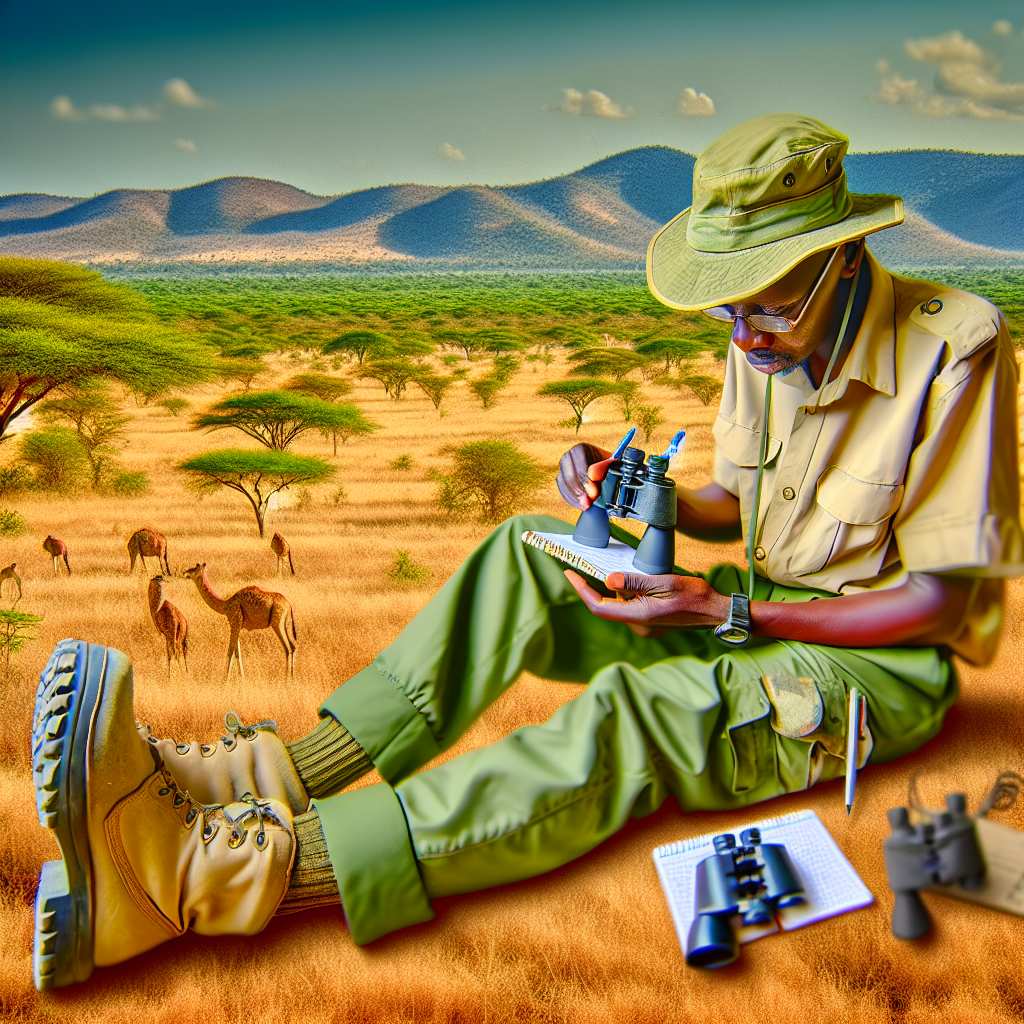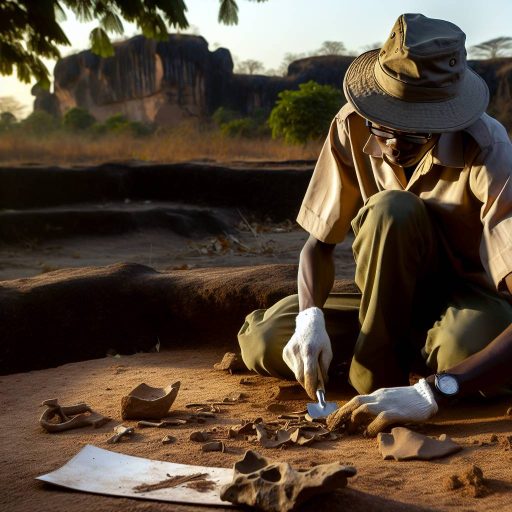Introduction:
Brief overview of applied zoology fieldwork in Nigeria.
Importance of fieldwork in studying and conserving wildlife.
Applied zoology fieldwork in Nigeria involves studying animals in their natural habitats to gather data for research and conservation efforts.
Fieldwork is crucial for understanding animal behavior, population dynamics, and habitat requirements for effective wildlife conservation strategies.
Fieldwork Preparation:
Before embarking on fieldwork in Nigeria, researchers need to obtain necessary permits from relevant authorities to conduct studies in protected areas.
Additionally, field researchers should be equipped with necessary gear such as GPS devices, cameras, binoculars, and field guides for species identification.
Fieldwork Activities:
Field researchers in Nigeria typically engage in activities such as wildlife tracking, setting up camera traps, and conducting surveys to assess animal populations.
Data collected during fieldwork is used to monitor species health, track migration patterns, and inform conservation strategies in the region.
Challenges of Fieldwork:
Field researchers in Nigeria may face challenges such as extreme weather conditions, difficult terrain, and encounters with dangerous wildlife during their fieldwork.
To mitigate risks, researchers are advised to work in teams, follow safety protocols, and seek local guidance when necessary.
Significance of Fieldwork for Wildlife Conservation:
In summary, applied zoology fieldwork in Nigeria plays a vital role in studying and conserving wildlife in the region.
Despite challenges, field researchers continue to make valuable contributions to wildlife research and conservation efforts.
Preparation for fieldwork:
Successfully embarking on an applied zoology fieldwork expedition in Nigeria requires meticulous preparation and attention to detail.
As a field researcher, it is crucial to ensure that you have adequately planned and equipped yourself for the challenges that lie ahead.
Here are some essential steps to take before heading into the field:
- Researching the specific area and wildlife species
- Packing essential supplies and equipment
- Obtaining necessary permits and permissions
Researching the specific area and wildlife species is imperative before setting out for your fieldwork.
Conduct thorough research on the specific area you will be visiting and the wildlife species you expect to encounter.
Understanding the habitat, behavior, and ecological needs of the animals in the area will help you tailor your research methods.
This understanding will maximize the success of your fieldwork.
Packing essential supplies and equipment
When preparing for fieldwork in Nigeria, it is essential to pack all the necessary supplies and equipment.
This includes items such as camping gear, field guides, binoculars, camera equipment, GPS devices, and first aid kits.
Any specialized tools or instruments required for your research should also be included.
Adequate food and water supplies should also be considered, especially in remote locations.
Obtaining necessary permits and permissions
Before conducting any research in Nigeria, it is essential to obtain the required permits and permissions from relevant authorities.
This may involve securing permits from wildlife conservation bodies, national parks, or local communities.
It depends on the nature of your research and the locations you plan to visit.
Failure to obtain the necessary permits can result in legal repercussions.
This can hinder your ability to conduct research effectively.
By adequately preparing for fieldwork in Nigeria through diligent research, packing essential supplies, and obtaining necessary permits, you can enhance your chances of conducting successful and meaningful research.
Remember to prioritize safety, respect local regulations and customs, and immerse yourself in the unique and diverse wildlife that Nigeria has to offer.
Typical Fieldwork Activities in Nigeria:
When it comes to applied zoology fieldwork in Nigeria, there are several activities that researchers and scientists engage in to study and conserve wildlife.
The typical fieldwork activities in Nigeria are diverse and challenging, providing valuable insights into the behavior and ecology of various animal species.
Conducting Wildlife Surveys and Population Assessments
One of the key activities in applied zoology fieldwork in Nigeria is conducting wildlife surveys and population assessments.
This involves going out into the field to observe and document the presence of different animal species.
Researchers use various survey techniques such as transect surveys, camera trapping, and direct observations to estimate population sizes and trends.
These surveys provide valuable data that help in understanding the distribution and abundance of wildlife species in different habitats.
By conducting population assessments, researchers can monitor changes in population sizes over time, identify threats to wildlife populations, and assess the effectiveness of conservation efforts.
Collecting Data on Behavior and Habitat Use
Another important aspect of applied zoology fieldwork in Nigeria is collecting data on the behavior and habitat use of wildlife species.
Researchers study the behavior patterns, feeding habits, reproductive strategies, and social interactions of animals to gain insights into their ecological role and conservation needs.
Field researchers use a combination of direct observations, GPS tracking, radio telemetry, and bioacoustics to study the behavior of wildlife species in their natural habitat.
Transform Your Career with Expert Guidance
Get personalized mentorship consulting that’s tailored to your unique path. Our expert advice is actionable and exclusive.
Get StartedBy collecting data on habitat use, researchers can identify the key resources that animals depend on and assess the impact of habitat loss and fragmentation on wildlife populations.
Setting up Camera Traps and Other Monitoring Devices
One of the innovative techniques used in applied zoology fieldwork in Nigeria is setting up camera traps and other monitoring devices.
Camera traps are motion-activated cameras that capture images and videos of wildlife species in their natural habitat without disturbing them.
Researchers strategically place camera traps in different habitats to monitor the presence of elusive and nocturnal species, such as leopards, elephants, and pangolins.
In addition to camera traps, researchers also use GPS collars, acoustic recorders, and satellite tags to track the movements and behavior of wildlife species in real-time.
Find Out More: Interdisciplinary Approaches in Applied Mathematics
Challenges of Fieldwork in Nigeria:
Fieldwork in Nigeria can be particularly challenging due to the country’s diverse climate and topography.
From the humid rainforests of the south to the arid savannas of the north, researchers must be prepared to face varying weather conditions and rugged terrain.
Nigeria is home to a wide range of wildlife, including potentially dangerous animals such as snakes, crocodiles, and big cats.
Researchers conducting fieldwork must be vigilant and take necessary safety precautions to avoid any unwanted encounters.
Fieldwork in Nigeria also poses cultural and logistical challenges.
Researchers must navigate unfamiliar customs, languages, and bureaucratic processes while conducting their studies.
This can sometimes lead to delays or misunderstandings that can impact the progress of the research.
- Extreme weather conditions and terrain
- Wildlife encounters and safety concerns
- Cultural and logistical challenges
Uncover the Details: Pioneering Geologists in Nigeria’s History
Collaborating with local communities:
Working in the field of applied zoology in Nigeria involves more than just studying animals in their natural habitat.
It also requires collaborating with local communities to ensure the sustainable conservation of wildlife and their habitats.
Engaging with local communities for conservation efforts:
Engaging with local communities is essential for the success of any conservation project.
It is important to involve community members in decision-making processes.
Working together towards shared conservation goals is vital.
Addressing conflicts between humans and wildlife:
One of the major challenges in wildlife conservation is the conflict that often arises between humans and wildlife.
As an applied zoologist working in Nigeria, it is crucial to address these conflicts.
This can be achieved through stakeholder engagement and conflict resolution strategies.
Providing education and training opportunities:
Education is key to promoting conservation awareness.
Fostering a culture of conservation within local communities is essential.
Providing training opportunities for community members on wildlife conservation can help build capacity.
This empowers them to take an active role in conservation efforts.
Learn More: Agricultural Economics Degree Programs in Nigeria

Data analysis and reporting:
Organizing and analyzing collected data in a systematic manner is crucial.
Drawing conclusions based on the analyzed data to make informed decisions.
Writing comprehensive reports that outline the findings and recommendations.
Sharing the reports with stakeholders to facilitate discussions and future actions.
Discover More: Government Support for Agricultural Science Students
Importance of Fieldwork in Applied Zoology
Emphasize the importance of fieldwork in applied zoology.
Fieldwork in applied zoology is crucial for gaining practical experience and understanding wildlife behavior.
It allows researchers to study animals in their natural habitat, leading to insightful discoveries and valuable data.
Encourage more students and researchers to get involved in fieldwork in Nigeria.
By participating in fieldwork in Nigeria, students and researchers can contribute to the conservation of the country’s diverse wildlife.
This hands-on experience not only enhances their knowledge but also promotes environmental stewardship and sustainability.
Highlight the potential impact of fieldwork on wildlife conservation and management.
Fieldwork plays a significant role in wildlife conservation efforts by providing insights into animal populations, habitats, and behaviors.
It helps in developing effective conservation strategies and management plans to ensure the survival of endangered species.
Through fieldwork, researchers can monitor wildlife populations, track migration patterns, and assess the impact of human activities on ecosystems.
Overall, fieldwork in applied zoology is essential for advancing research, promoting conservation efforts, and fostering a deeper appreciation for our natural world.
Additional Resources
Top Nigerian Universities Offering Applied Zoology Programs
Wednesday 31 July 2024 Nigerian Institute of Medical Research …




